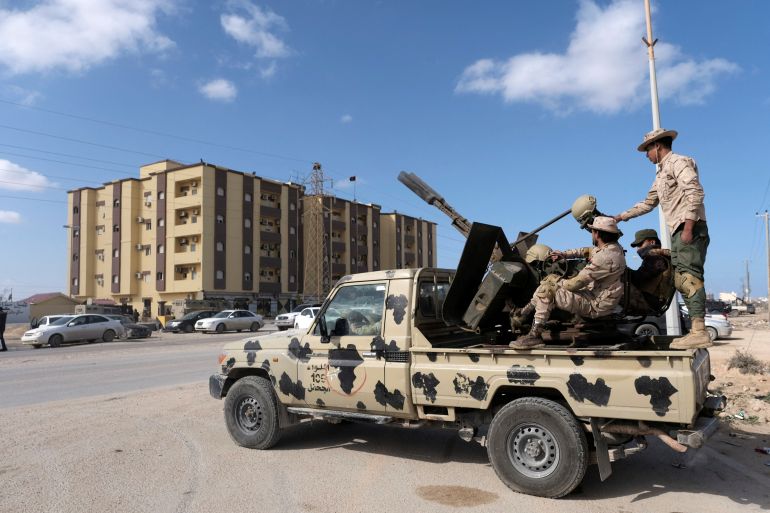Russians unlikely to leave Libya, despite Ukraine war
Despite rumours that Russia’s Wagner will fight in Ukraine, analysts expect the paramilitary group to stay in Libya.

Russia’s Wagner Group, a shadowy paramilitary organisation tied to the Kremlin, has played a significant role in Libya, supporting renegade military commander Khalifa Haftar’s self-styled Libyan National Army (LNA) in the country’s civil war.
Western observers had begun wondering in recent weeks whether Wagner forces would be withdrawing from Libya to instead focus on supporting Russia’s invasion of Ukraine.
Keep reading
list of 3 itemsLibya armed groups backing rival PM withdraw from Tripoli
Libya: UN offers mediation after swearing in of new rival gov’t
Although Moscow might need to adjust and reconfigure its mission in Libya, there is good reason to expect the Russians to continue their campaign, which has served to shape the security architecture of Libya’s east, where Haftar is based, and entrench itself.
“Before February 24 [when the Russian invasion of Ukraine began], there was no indication that the clandestine Russian mission [in Libya] was withdrawing, shrinking, or anything of the sort,” Jalel Harchaoui, a researcher specialising in Libya, told Al Jazeera.
“It was rather quiet. The Libyans who live near [Russian] bases got used to seeing some Russians at the grocery store. Some camps, bases, and air bases are known to be fully controlled by Russians,” Harchaoui added. “In those particular cases, even the LNA itself sometimes needs to get permission before entering the base.”
While there are some unconfirmed reports that Russian mercenaries have been withdrawn from the country to fight in Ukraine, the majority have remained.
“The number of [Russian] fighters who made their way to Ukraine would probably be tiny as the Kremlin wants to have a stake in Libya’s future and needs these foreign mercenaries to maintain their hold on the country,” said Ferhat Polat, a Libya researcher at the TRT World Research Centre.
Sustaining a military presence in Libya is key to Russia’s agendas elsewhere on the African continent, especially in the Sahel region.
In late 2021 and early 2022, for example, Russian planes transported armed personnel and arms from Syria to Mali via an airbase near Benghazi.
“You clearly have reliance on the perennial and permanent character of the Russian footprint in Libya. It wasn’t about to shrink,” said Harchaoui. “Even the reduction, the modest drawdown of probably 300 or 400 individuals is not the end of the mission. It doesn’t presage, announce, or augur capitulation.”
It is important to take stock of the extent to which Russia’s role in eastern Libya has become important not only to Haftar and those Libyans aligned with him, such as parliament-appointed Prime Minister Fathi Bashagha, but also other external actors with stakes in the North African country’s uncertain future.
The Russians have built up a presence in Libya that makes Haftar structurally unable to detach himself from Moscow.
The complete withdrawal of Russian forces from the country would throw off the balance of power that has protected Haftar’s longevity in the east. With at least three airbases, military camps, and spies on the ground, the Russians retain vast amounts of leverage in Libya that no meaningful power appears to be eager to seriously diminish.
“There’s no NATO plan to remove Russia [from Libya],” explained Harchaoui. “The reason is, because Haftar is the only security architecture for huge parts of Libya — the eastern half mainly. Haftar is someone that you cannot preserve if you go after the Russians. If you forcefully remove the Russians, you will automatically and inevitably weaken Haftar.”
Turkish-Russian balancing act
Turkey, one of NATO’s militarily most powerful member states, will keep a close eye on ways in which the war in Ukraine might affect Russia’s influence in the Maghreb.
Although Ankara and Moscow have supported opposing sides in Libya, they also maintain a relationship based on “adversarial collaboration” that allows them to pursue economic, political, and military goals in their respective areas in the country and elsewhere.
While Turkey would support another military venture against the LNA were Haftar to mount another offensive as he did in April 2019, Ankara would prefer to avoid a major confrontation with Russia in Libya.
Reports indicate that Ankara has made several efforts at dialogue with Bashagha in recent weeks, including inviting him to Turkey and agreeing to push Bashagha’s rival, the United Nations-backed prime minister, Abdul Hamid Dbeibah, into negotiations. Bashagha and Dbeibah both claim to lead Libya’s legitimate government.
Russia, facing economic, military, and diplomatic pressures at home, is far less likely to entertain Haftar waging another large-scale offensive.
“The decisive failure of the LNA offensive on Tripoli … will likely deter a major Russian military intervention in Libya going forward,” said Samuel Ramani, an associate fellow at the Royal United Services Institute.
Such a venture would likely be met with a Turkish-backed, and US-blessed, military counteroffensive by actors in western Libya, especially considering the world’s new geopolitical atmosphere in which Washington has a renewed appetite for countering Russia. At the same time, an oil blockade by Haftar may elicit sanctions and other tough measures.
Over the years, Haftar and his allies have become renowned for their demands. Amid this year’s tense environment, this could trigger a surprisingly firm response by international actors who have not forgotten that Russia is ingrained in Libya by Haftar’s side.
Despite that, Moscow is likely to hang on in Libya irrespective of the war in Ukraine, as it is in the interests of a number of countries, including Western allies and partners, to not change the balance of power in the country.
“Egypt, the UAE, Israel, and France don’t want that [a weakening of Haftar],” said Harchaoui. “These [countries] influence Washington, which cares deeply about Egypt. Egypt is a very populous nation and this notion of altering the equilibrium in eastern Libya is seen as a destabilising threat for a nation that has a population of 103 million.”